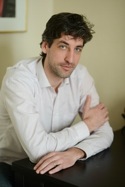Guests at the Division 2015
| Song Yunwei will join Per Högselius in the Swedish Resource Colonialism project, the main aim being to write a paper on Swedish natural resource-related activities in China in the early 20th century. Yunwei is an associate professor at the School of History at Renmin University of China in Beijing, where she teaches world history. She is also affiliated with Renmin’s Center for Ecological History, with which some of us will already be familiar. She holds a PhD from Peking University (2002). Her doctoral dissertation and first book (The Period of Dual Federalism in the United States) dealt with the relationship between federal and state governments before the American Civil War. Her current academic interests are on the history of natural resources policy. Her second book (The History of Nature Resources Policy in the United States) was published in 2011. She has also published articles on themes such as the management and development of Indian forests during the British colonial period and the US Timber Culture Act of 1873. |
September-December |

His most recent project on Global Environmental Images explores the rich and complex environmental iconography associated with an increasingly global conception of the alarming consequences of our own actions on the environment. Images (yet also metaphors, rhetoric and imagination) are particularly helpful in analysing this historical development because they help bridge the gap between scientific theories of ecological and biophysical processes and public engagement, between the environmental sciences and environmental politics. |
June 8-12 |
| Ole Jone Eide, PhD student from the University of Stavanger, Norway, will be a guest at the Division from 19 May to the end of June. Ole Jone is doing his PhD in history on Norway and international law in the Arctic: Folkerettslig fellesskap og Norge i Arktis 1910-35. En studie av folkerettseksperter, deres fellesskap og relasjonene til politikk og byråkrati. "Hovedmålet med avhandlingen er å undersøke sentrale jurister som opptrådte som folkerettslig sakkyndige og/eller som forhandlere i forbindelse med Norges territorielle krav i Arktis mellom 1910 og 1935. Dette innebærer å analysere enkeltjurister, deres innbyrdes relasjoner og relasjoner til sentrale politikere og byråkrater, særlig i Utenriksdepartementet. De tre sakene som skal undersøkes er spørsmålene om Spitsbergen, sjø-/territorialgrensen utenfor Finnmark, og Grønland. De viktigste personene (angående Spitsbergen og sjø-/territorialgrensen) er juristene Arnold Ræstad, Johan Wollebæk, Francis Hagerup, Hjalmar Hammarskjöld og Fredrik Wedel Jarlsberg." |
May-June |
| Rachel P. Maines, Cornell University. Rachel's principal current research interests are in the history of technology, especially building codes and engineering standards. | 6-16 May |
| Tuomas Räsänen is a researcher at the department of European and World History at the University of Turku, Finland. His post-doctoral research concerns the interaction between humans and certain iconic wild animals in the Finnish society. He is particularly interested in how the human-animal relationships have contributed to the evolution of environmental ideas in Finland in the second half of the twentieth century. |
13-30 April |
| Leandro Sgueglia is a PhD student in gender studies at the University of Naples, Italy where he is working on women activists and the waste crisis in Campania. Leandro will spend almost 1 month at the division. | February-March |
| Paul Josephson, professor in history at Colby College, is a specialist in the history of twentieth century science and technology, and also studies the philosophy of science and Neo-Luddism. He has written twelve books, most recently a history of everyday objects from soda cans to bananas to sports bras. The study of large scale technological systems and their potential extensive environmental damage led Josephson into environmental history, and his book Industrialized Nature (Washington and Covelo, CA: Island Press, 2002) has been used to teach the Environmental History course at the Division. During his stay, Paul will teach a postgraduate course on Comparative Environmental History of Large Scale Technologies in the 20th Century . |
January-April |
